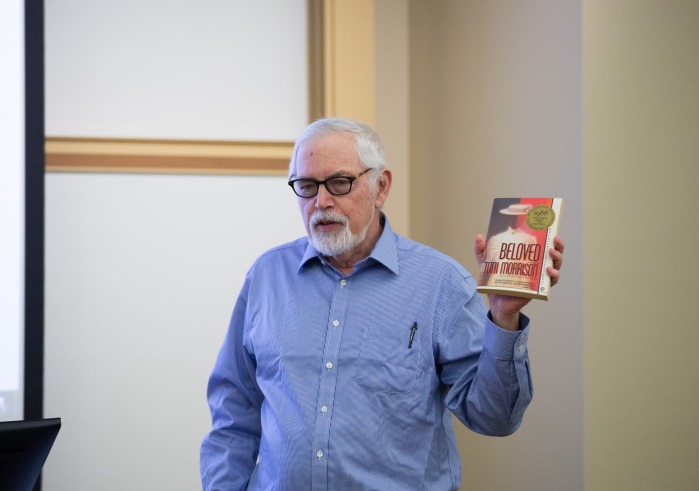Toni Morrison's Beloved and the Language of American Fiction

The internationally reputed American literary scholar Jonathan Arac gave Soka students and professors an insightful look into the tragic world of Toni Morrison’s classic novel Beloved. Arac explored millennia of literature in his lecture, citing works from Aristotle to Jane Austen to demonstrate the novel’s universal and timeless themes.
Arac began his lecture with an exposition on the history of slavery in the U.S. and explained slavery’s changing representation in literature: “prior to 1950, [the] history of slavery was written from the point of the slaveholder.” He then cited Auerbach’s Mimesis: The Representation of Reality in Western Literature as an indicator of the change, which reads “great literature may be made from the experiences of everyday life.” Arac explained that this pithy realization showed how later writers would “[take] artistic authority out of the hands of the institution and into the hands of the enslaved,” and that this new direction- “finding the right language”- would allow people to produce “new and true perceptions.”
Arac’s investigation into Toni Morrison uncovered her “affinity for Greek tragedy,” an art form he defined as “unspeakable things being spoken.” According to Arac, Morrison used the tried and true power of Greek tragedy to tell her story because of its “contradiction of pity (it can happen to me) and terror (how can it be)?” However, Arac made it clear that despite Greek tragedy’s impression on Morrison, she was not writing a tragedy but a novel. Received with some protest from Soka’s humanities professors, Arac used Georg Lukács’ definition of the novel as “an epic of a world abandoned by God.”
Arac’s concluded his lecture with a nod to Walter Benjamin’s concept of “civilization & barbarism,” a direction that incited a respectful albeit heated discussion among the humanities professors Jim Merod and Oleg Gelikman. Students sat in awe as the unique minds of Arac, Merod, and Gelikman contested and refined theories in a candid conversation that continued for hours after the event.
When asked what one should take away from his lecture, Arac replied: “…the thought that it’s possible that out of the greatest historical pain to make something beautiful & powerful.”
—Riley Murphy ‘20
